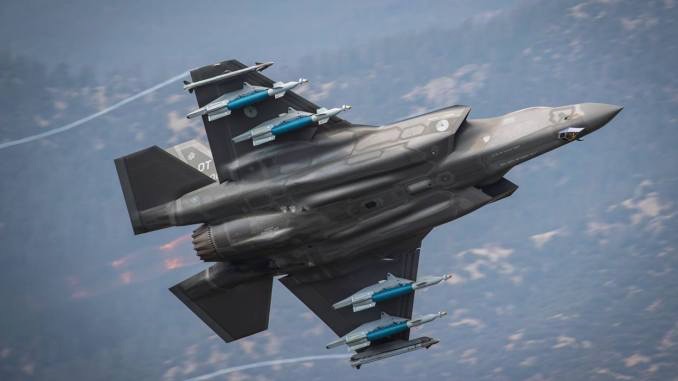
DUBAI: Ever since Donald Trump designated the United Arab Emirates and Bahrain as “major security partners,” experts have been trying to assess what it means and what sort of privileges the designation bestows. Some see it as a symbolic gesture; others see it as an indication for much-improved relations resulting from the Abraham Accords that would eventually yield rewards for the two regional allies of America.
Four days after the designation was made and hours before former President Trump ceased to be president, the U.S. signed a letter of agreement (LOA) with the UAE for the purchase of 50 F-35 joint strike fighter aircraft and 18 MQ-9 Reaper drones, a package worth an estimated $23.4 billion.
Then, just over a week after President Joe Biden, took the oath of office, the State Department announced it was “pausing” arms sales to Saudi Arabia and the UAE, pending a full review to see whether these agreements “meet current U.S. objectives.”
For many, the U.S. move against a state it just designated as a “major security partner” raises fundamental questions about the designation. Does it stand for anything?
The view from the UAE is that relations between the two old allies have come of age and it is only natural to see it moving forward.

The state of play in military space
The military space sector is evolving fast. Get the latest from Space Force and industry officials on what’s next for acquisition, policy and training in a new Breaking Defense eBook.
“The UAE has moved from the minor league to the major league in its position and role in the Middle East, and also in its relations with the United States,” said Abdulkhaleq Abdullah, a political science professor in the UAE. “Designating UAE as “major security partner” is a signal that it is being viewed to be in a special category.”
But, what about the latest move by the Biden Administration to review the F-35 deal?
The UAE Ambassador to the U.S. Youssef Al Otaiba said he was not surprised by the State Department announcement, which was “anticipated.”
“The UAE will work closely with the Biden Administration on a comprehensive approach to Middle East peace and stability,” Ambassador Otaiba said in a Tweet.
The view from Washington is more cautious.
“I’m not aware of a category of “major security partner” in law or regulation, and it is laws and regulations, not statements, that drive US defense policy,” Jon Alterman, director of the Middle East Program at the Center for Strategic and International Studies in Washington, said.
Patrick Clawson, director of Research at the Washington Institute for Near East Policy, believes the major security partners designation “is mostly symbolic, though it could facilitate some arms sales. It is directly a reward for the Abraham Accords.”
The accords are the formal name for the normalization of relations’ treaties signed between Israel and some Arab countries, in a process kick-started by the UAE and Bahrain last September, and has since attracted additional countries like Morocco and Sudan. More are expected to join.
“The major security partner label seems to have been devised specifically for Bahrain and the UAE, in the way that the label “major defense partner” was devised for India. I don’t believe that either label had/has any basis in law,” said Michael Eisenstadt, director of the military and security studies program at the Washington Institute for Near East Policy. “Likewise, Israel is referred to in US documents as a “major strategic partner” which, as far as I know, has no basis in law either–not in the way that ‘major non-NATO ally’ designation does have specific implications under law.”
In some of his presidential campaign speeches, Biden was critical of the war in Yemen, where UAE is a member of a coalition led by Saudi Arabia fighting to uproot Iranian-backed Houthi militia from power.
“The Biden team is still taking shape, and one of their priorities will be adjusting what they saw as some of the excesses in the Trump approach to the Gulf. That is not their only priority, and it is not their most urgent, and I expect it will take some months until its main parameters are clear,” Alterman told BD.
Eisenstadt pointed out that, regardless of what could have been said on the campaign trail, relations with the UAE and other Arab Gulf States, especially Saudi Arabia, are of great strategic importance to Washington.
At a press conference yesterday Secretary of State Antony Blinken, underlined the importance of U.S.-Saudi relations and reaffirmed the U.S. commitment and support to the Abraham Accords.
Abdullah asserts that the UAE has very good relations with President Biden and many members of his team and does not at the moment have causes to be concerned about the implementation of the F-35 deal, “which has already gained the approval of all relevant government institutions in the U.S. and the Israeli blessing.”
The new Defense Secretary, Lloyd Austin, established good relations with many officials in the UAE and the Middle East during his tenure as head of Central Command. Also, former U.S. Ambassador to the UAE Barbara Leaf has recently joined President Biden’s National Security Council team that oversees Middle East and North Africa policy.
Leaf rejected claims made by some U.S. lawmakers that the F-35 deal will affect the long-standing US policy of ensuring Israeli military superiority in the Middle East. “This won’t change the military balance in the Middle East,” she said at a conference last December, adding that “Iran’s missile and non-conventional arsenals are formidable and could wreak immense damage.”
And, as Breaking D readers know, Israeli Prime Minister Netanyahu secretly approved the F-35 sale before the normalization of relations was announced. So that would seem to lessen the chances of Israel and its American supporters opposing the sale.
So what is likely to be the final result for the fighter sale? Anelle Shelin, a senior fellow for the Middle East at the Quincy Institute for Responsible Statecraft, said in a statement distributed by the Washington-based thinktank that the arms “sales may ultimately go through, as a review of a previous administration’s weapons sales is not uncommon.”